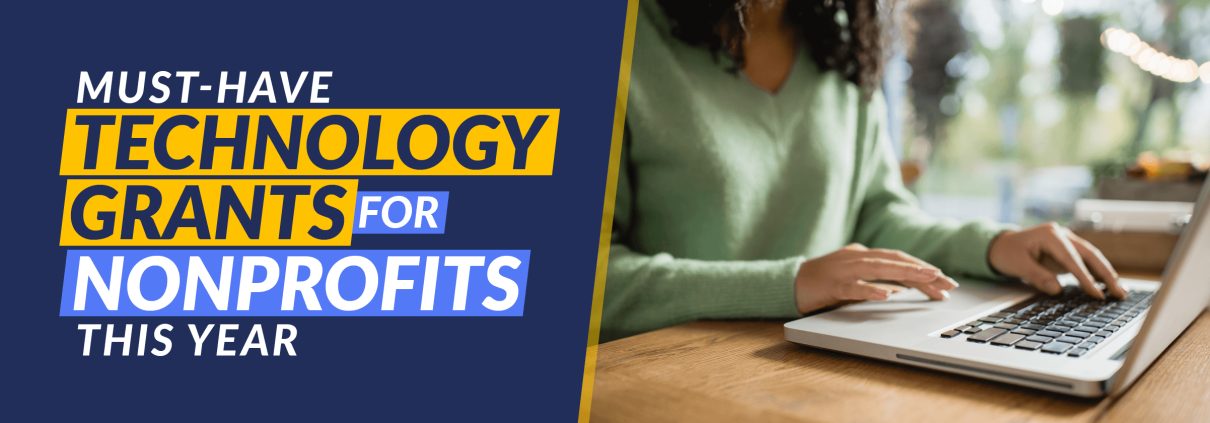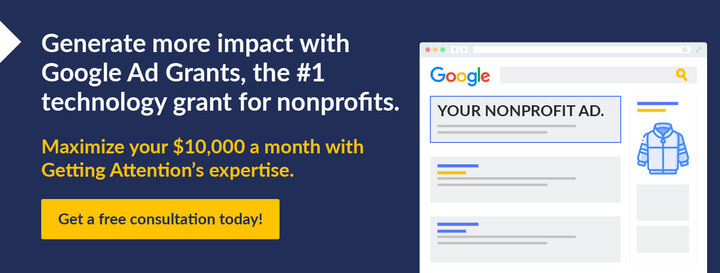13 Must-Have Technology Grants for Nonprofits This Year
According to Nonprofit Tech for Good, many nonprofits are leveraging technology to enhance their processes—79% use automation technology in online fundraising, and 15% even have artificial intelligence software in place to predict donor behavior. Not every organization, however, has the funds to stay at the cutting edge of technology.
That’s where nonprofit technology grants come in. These grants supply the necessary funds for forward-thinking nonprofits to gain access to software solutions and resources that will magnify their impact. In this guide, we’ll cover:
- What are technology grants for nonprofits?
- How can technology grants support nonprofits?
- 13 Top Technology Grants for Nonprofits
- How do I find the right technology grant for my nonprofit?
To achieve bigger and better results, nonprofits must continually adopt and adapt to advances in technology that streamline essential processes such as fundraising, marketing, and donor engagement. By doing so, your organization can free up more capacity for what matters most: bettering the lives of those you serve.
What are technology grants for nonprofits?
Nonprofit technology grants provide essential funding for organizations to acquire and implement cutting-edge tools and software, significantly enhancing their impact and efficiency.
These grants can cover a wide range of technological needs, including:
- Software Licenses and Subscriptions: Funding for purchasing licenses for essential software tools such as CRM systems, accounting software, project management tools, and other specialized applications
- Hardware and Equipment: Grants for acquiring computers, tablets, networking equipment, and other hardware necessary for daily operations and service delivery
- Cybersecurity Solutions: Support for implementing cybersecurity measures to protect sensitive data and ensure compliance with data protection regulations.
- Website Development and Maintenance: Funding to build, redesign, or maintain a nonprofit’s website, ensuring it is user-friendly, accessible, and up-to-date with current technologies
- Innovation and Development Projects: Support for innovative technology projects that address specific challenges or opportunities within the nonprofit’s mission, such as developing new apps or digital platforms
While general grants can sometimes address technological needs, it’s often more effective to apply for grants specifically tailored to technology. Tailored technology grants are designed to address the unique challenges and opportunities associated with implementing and managing technological solutions, providing more targeted support and resources.
Where can nonprofits find technology grants?
Like most grants, technology grants are typically offered by three primary sources:
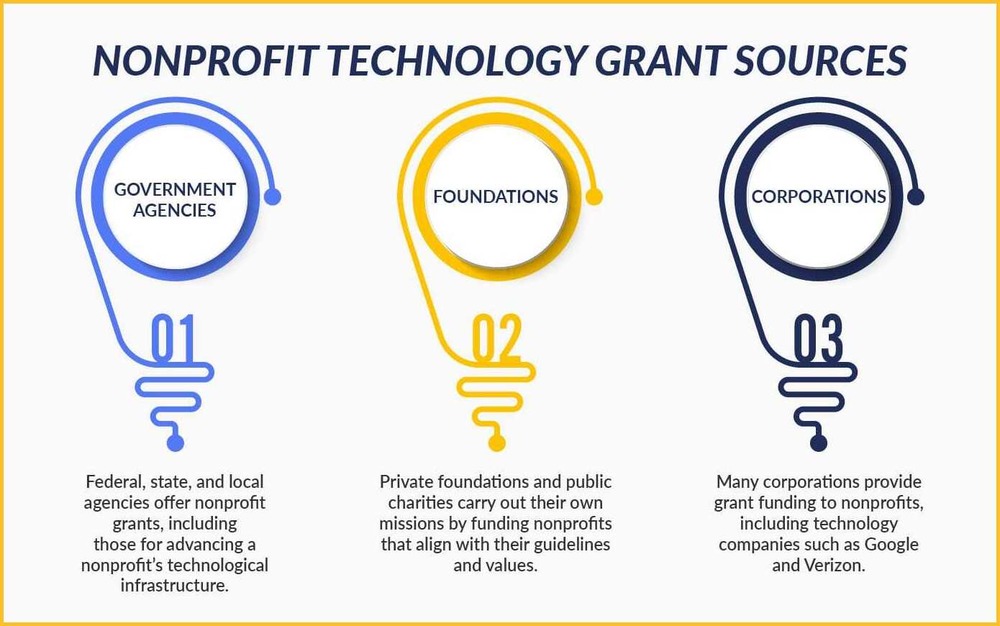
- Government agencies: Federal, state, and local governments offer grants to cover different needs. Government sources often provide funding for nonprofits seeking technology grants to upgrade systems and improve service delivery. Although, these grants are often highly competitive.
- Foundations: Foundations are a traditional and reliable source of funding for nonprofits. They can range from well-known entities like the Ford Foundation and the Bill and Melinda Gates Foundation to local community foundations. While foundation grants may not always be large, they can be instrumental in helping organizations improve their technology infrastructure.
- Corporations: Major companies such as Google and Walmart offer dedicated technology grants for nonprofits as part of their CSR efforts. In particular, tech companies are aware of the critical role their products play and have developed grant programs to help nonprofits access essential technology. Corporate grants can provide significant resources, enabling nonprofits to implement state-of-the-art tools and software to better serve their communities.
No matter your organization’s focus—whether you’re an environmental nonprofit or a nonprofit hospital—access to the latest technology enables you to serve your beneficiaries more effectively and achieve better outcomes. Look to these sources to find an opportunity that matches your organization’s needs.
How can technology grants support nonprofits?
Depending on your specific goals, a technology grant can empower your nonprofit to:
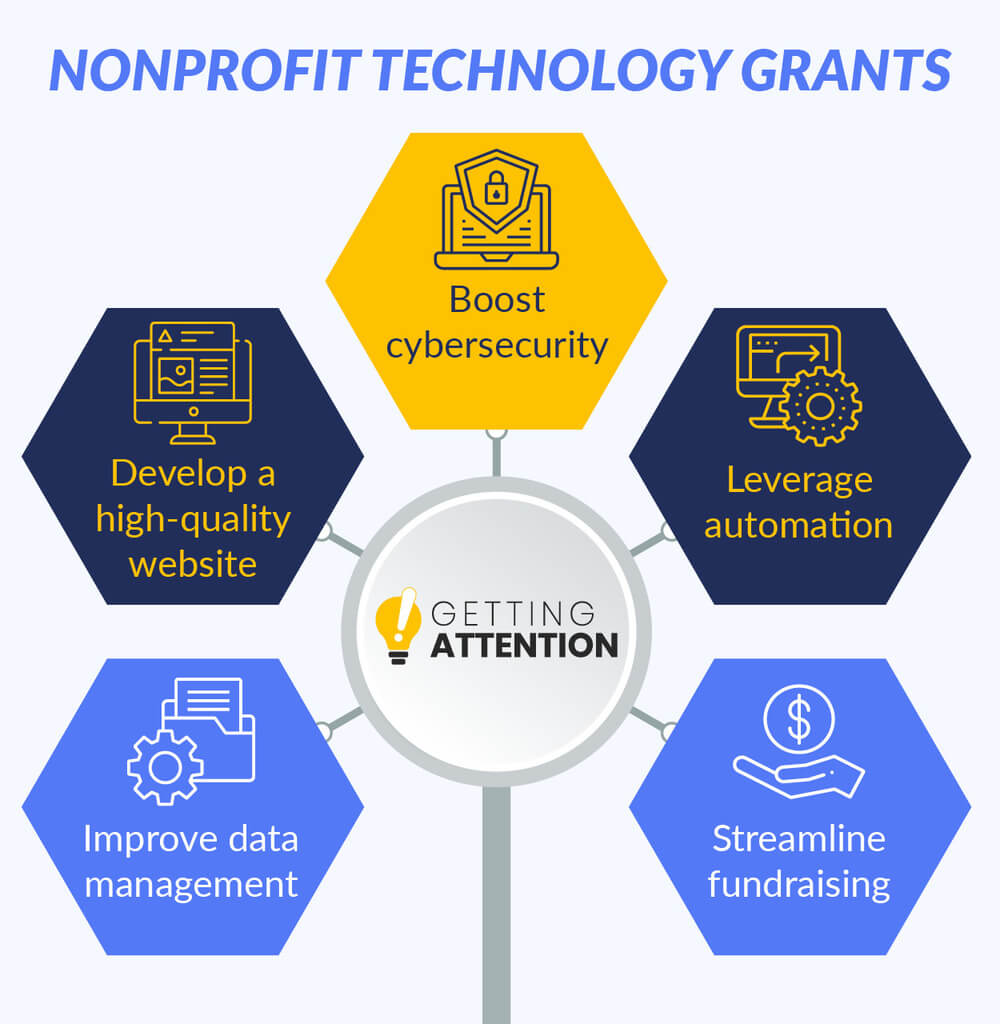
- Boost cybersecurity. NTEN’s State of Nonprofit Cybersecurity Report reveals that only around 20% of surveyed nonprofits have documented policies and procedures in place should a cyberattack occur. A technology grant can provide your organization with cybersecurity training resources and the right tools to keep your information secure.
- Leverage automation. A technology grant allows your organization to streamline daily operations through automation, significantly reducing the time and resources required for tasks such as data entry and donor management. For example, implementing an automated CRM system can free up staff to focus on strategic initiatives and direct service delivery, enhancing overall efficiency and impact.
- Streamline fundraising. A technology grant can enable your organization to adopt top-of-the-line CRM software and digital fundraising tools that make it easy to manage supporter relationships and solicit gifts.
- Enhance data management. Efficient data management is crucial for personalizing communications, engaging donors, and deriving valuable insights to refine your strategies over time. With a technology grant, your organization can prioritize advanced data management systems, enabling staff and volunteers to harness data effectively for greater strategic impact and decision-making.
- Develop a high-quality website. A nonprofit technology grant can provide the necessary funds to elevate your current website or create an entirely new one that complies with all nonprofit site requirements and inspires more support.
Once you’ve pinpointed your organization’s specific needs for technology funding, it’s time to find a funder that best aligns with your mission and values. The more well-matched you are to the grantmaking organization, the more likely you’ll succeed in winning the grant.
13 Top Technology Grants for Nonprofits
Use these nonprofit technology grants as a jumping-off point to your pursuit of technology funding:

1. Google Ad Grants
Since its creation, the Google Ad Grants program has provided over $10 billion in free advertising to nonprofits. All eligible organizations can receive $10,000 monthly to bid on keywords for ads that will appear on Google’s search results pages. With these ads, you can promote key pages on your nonprofit’s website, such as your donation page or event registration page, to generate more support for your cause.
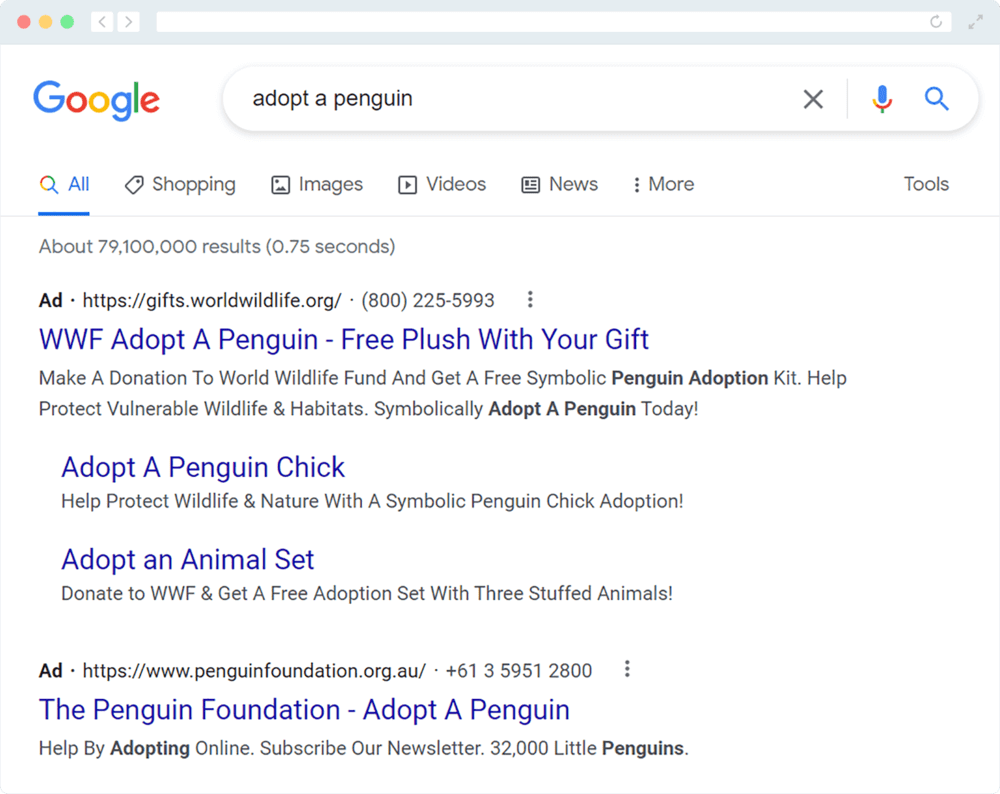
To meet the program’s eligibility criteria, your organization must:
- Be a registered 501(c)(3) nonprofit.
- Not be a government, healthcare, or educational institution.
- Have a high-quality website.
- Create a Google for Nonprofits account.
Ready to start leveraging $10,000 a month for free advertising? Sign up for our Google Ad Grants newsletter to learn insider tips and maximize your results.
This nonprofit technology grant can equip your organization with a powerful tool for spreading the word about your mission and attracting more supporters to your cause. To ensure that you secure your grant and make the most of it, consider turning to a Google Ad Grants agency like Getting Attention that can take care of the entire process for you.

2. Salesforce’s Power of Us Program
Salesforce is a leading customer relationship management (CRM) platform that provides a comprehensive suite of cloud-based applications and services. The Power of Us Program has provided discounted CRM technology access to over 56,000 nonprofits and educational institutions. To join these ranks, your organization must:
- Be a registered 501(c)(3) or 501(c)(4) nonprofit or a higher, primary, or secondary educational institution.
- Not be a hospital, academic medical center, or economic development organization.
- Comply with Salesforce’s Acceptable Use External-Facing Services policies.
You can explore the full list of requirements here. When awarding grants, the Salesforce Foundation prioritizes alignment with its grantmaking goals, demonstrated program impact, a commitment to measuring and adapting, and a strong leadership team that reflects the community it’s addressing.

3. Twilio
Twilio is an SMS and messaging platform that empowers social good organizations to extend their reach. In 2023, an incredible 20,000 organizations used the platform to send over 22 billion messages.
Through its Impact Fund, Twilio awarded $7.3 million in grants and investments to expand access to transformative communications technology for social impact causes last year. Organizations that are eligible for this nonprofit technology grant funding must:
- Be a recognized 501(c)(3) nonprofit or have equivalent status.
- Not be a government entity, unregistered social impact initiative, political organization, or for-profit entity.
Currently, Twilio is funding projects in digital transformation, humanitarian assistance, and climate action. To receive an invitation to apply, sign up for the Impact Access Program, which offers additional benefits such as discounts on Twilio products.

4. Okta for Good
Okta is a comprehensive identity and access management platform that offers organizations secure single sign-on capabilities, authentication and authorization, password management, user provisioning, security and compliance, and mobile device management.
Okta for Good’s Nonprofit Technology Initiative strives to meet nonprofits’ technology needs by supplying $10 million in philanthropic funding. They’re also providing an additional $10 million via in-kind donations of their technology and services. To be selected for these funds and donations, nonprofits must:
- Be a recognized nonprofit organization in their country of operation.
- Have strong leadership teams and mission alignment with Okta.
Whether your nonprofit is seeking to improve its data security or move to the cloud, Okta’s focus on digital transformation is worth looking into for any organization interested in technology improvements.

5. Box Impact Fund
Box Impact Fund supports nonprofits on their path to adopting technology that will enhance their daily operations and work. To meet Box Impact Fund’s eligibility requirements, organizations must:
- Have legal status in your respective country.
- Focus on child welfare, crisis response, or the environment.
- Propose a digital transformation project.
Box lists four specific criteria for evaluating grant applications: alignment, impact, inclusion, and scale. Ensure that your organization matches this funder’s priorities to set your application up for success.

6. Cisco Product Grant Program
Cisco is a multinational technology conglomerate that designs, manufactures, and sells networking hardware, telecommunications equipment, and other high-technology products.
The Cisco Product Grant Program supplies networking and communications technology to nonprofits focused on crisis response, education, economic empowerment, and climate change. To be eligible for the program, organizations must:
- Be recognized as a 501(c)(3) nonprofit or equivalent in your country.
- Serve the community at large.
- Have more than one year of successful operations.
- Not be a school, hospital, library, or food bank.
- Not exceed an overhead of 25%.
Cisco accepts grant proposals year-round and reviews them quarterly. To ensure your nonprofit meets all the criteria, take this eligibility quiz that Cisco provides on its website.

7. Microsoft Tech for Social Impact
Microsoft is a leading multinational technology company. The company launched Microsoft Tech for Social Impact to provide discounted and donated Microsoft tools to nonprofits. These tools can empower your nonprofit to securely manage supporters’ data, reduce operating costs, and enable remote opportunities for staff and volunteers.
To be eligible for Microsoft’s nonprofit programs, your organization must:
- Be a recognized 501(c)(3) nonprofit, public library, or public museum.
- Comply with Microsoft’s anti-discrimination policy.
- Only assign licenses to eligible staff members.
One of Microsoft’s most popular nonprofit technology grants is the Azure grant, which awards applicants with $2,000 credits per year and access to the complete portfolio of Azure products and cloud services. On its website, Microsoft provides a step-by-step registration process to access available tech.

8. Technology Innovation Awards
Tech Forward is a nonprofit technology conference that unites organizations to explore how technology can enhance their missions. At the conference, the host provides $10,000 through its annual Technology Innovation Awards to support nonprofits seeking funding for technology-related projects. To be eligible for this grant, your organization must:
- Be a 501(c)(3) or 501(c)(4) charitable organization.
- Not be a church, private educational institution, nonprofit hospital, or governmental unit.
- Have an annual operating budget of at least $500,000.
- Send a representative to the conference to accept the award.
As part of the nonprofit technology grant application, you’ll need to present information such as your mission, services, and key constituents, along with a full technology project proposal.

9. TechBridge
TechBridge makes enterprise-grade software to empower nonprofits to eliminate generational poverty. TechBridge’s Dream Big Grant provides an opportunity for nonprofits to acquire technology solutions that will enhance their operations and boost their impact. To be eligible for one of these grants, your organization must:
- Be a recognized 501(c)(3) nonprofit with a minimum two-year operating history.
- Focus on one of four pillars: hunger relief, homeless support, social justice, or workforce development.
- Have annual operating expenses over $2,000,000.
- Have at least five full-time paid employees who are paid minimum wage or more.
The application process for one of these technology grants for nonprofits includes an eligibility check, an application essay, and a video submission.

10. Verizon Foundation
Verizon offers invitation-only grants to support nonprofits in three main areas: digital inclusion, climate protection, and human prosperity. Nonprofits must contact their local community relations manager about receiving an invitation. If you’re approved to apply, you’ll still have to meet these eligibility requirements:
- Be a recognized 501(c)(3) nonprofit and further classified as a public charity or a not-for-profit school.
- Not duplicate or significantly overlap the work of public agencies.
- Keep books available for outside audits and make results available to all potential contributors.
Furthermore, if you request funds for IT infrastructure improvements that total more than 20% of the grant’s total direct costs, you must provide specific details on how your organization will use those IT assets in your grant application.

11. HP Technology for Community
HP is a multinational information technology company that develops and sells hardware, software, and services. The company supplies grants to nonprofits so that they can purchase technology to better serve their purposes. To be eligible for HP Technology for Community, organizations must:
- Be a 501(c)(3) nonprofit.
- Not be a member agency or a school.
- Not be located outside of the United States.
While qualified nonprofits can apply from across the country, HP will give preference to those operating in or near the site communities listed in its requirements.

12. The Change Happens Foundation
The Change Happens Foundation is a private nonprofit foundation dedicated to supporting nonprofits focused on creating social change around science, the environment, and education. The foundation offers several grants in these areas. To be eligible, organizations must:
- Be a recognized 501(c)(3) nonprofit.
- Not be faith-based or located outside of the United States.
- Have a three-year history of 990 forms.
Once you’ve determined your nonprofit’s eligibility, you must submit a Letter of Inquiry as a first-time applicant to determine if the foundation’s interests align with your request. Organizations accepted for further consideration can then submit their grant proposals.

13. TechSoup
TechSoup provides nonprofits and libraries with discounted technology products, services, and training to enhance their mission-driven work. While not explicitly a nonprofit technology grant, it provides incredible offers from leading brands like Microsoft, Adobe, and Zoom.
To be validated by TechSoup, your organization must:
- Be registered as a nonprofit or religious organization.
- Operate on a nonprofit basis for the public benefit.
- Hold all necessary permissions to receive donations from abroad where applicable.
TechSoup even provides a convenient eligibility quiz. Before applying, explore TechSoup’s full product catalog to determine how access to different technologies will impact your organization.
How do I find the right technology grant for my nonprofit?
This list is a great starting point, but there are a few easy steps you should take to choose the best grant for your team. With the right approach, you’ll be well on your way to securing funding for transformative technology initiatives that will enhance your nonprofit’s efficiency, effectiveness, and overall impact.
1. Refer to your goals and mission.
Before starting your search for grant opportunities, it’s important to root yourself in your organization’s goals and mission. This ensures that you only identify and apply for technology grants that are well-suited to your nonprofit.
Remember that each grantmaking organization has its own mission and interests. As a result, they’re more prone to fund nonprofits that align with their own priorities and generate the kind of impact that they’re looking to see.
2. Conduct research.
Among possible technology grant sources, there are around 127,595 foundations in the United States alone. Because of this, it’s essential to be strategic in your research to find the best options. Follow these best practices to get started:
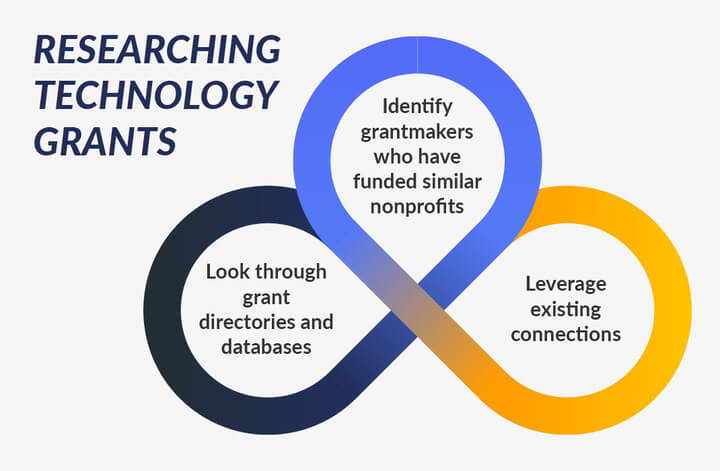
- Study similar nonprofits and locate grantmakers who’ve funded them in the past.
- Identify existing connections that your board or staff members may have with funders.
- Look through grant directories and databases, such as Grants.gov and Foundation Directory.
Review each nonprofit technology grant’s application criteria to ensure that you’re eligible to apply. For instance, some grantmakers may require your organization to be located in a specific region or area.
3. Prepare your technology grant application.
Once you’ve found a nonprofit technology grant that you’re interested in applying for, personalize your application according to the research you’ve conducted on the funder. An effective grant application clearly defines your nonprofit’s needs, leverages storytelling to convey your impact, and specifies realistic goals for the funding you’re requesting.
4. Consider seeking expert help.
If your nonprofit wants additional guidance to make your technology grant applications stand out, consider partnering with a nonprofit grant consultant or a tailored marketing agency.
Top nonprofit grant consultants will devote themselves to ensuring that your organization’s grant efforts succeed. Plus, those that specialize in your industry understand your unique needs. For instance, a church might hire an agency to find relevant grant opportunities available to religious organizations.
For a specific example, Getting Attention’s experts fully understand the Google Ad Grants program. From confirming your eligibility to complying with the latest regulations, we know the program’s intricacies and can help you acquire and retain the grant. When you partner with us, our team will take the time to fully understand your mission so we can craft compelling ads that accurately represent your work and inspire likely supporters.
Set high expectations for your technology grant consultant and choose one who will do the following:
- Learn the ins and outs of your nonprofit, including your mission, impact, and target audience.
- Develop a dedicated strategy and conduct research to identify grant opportunities that align with all that they’ve learned about your organization.
- Handle your nonprofit grant applications to maximize your chances of winning the grant.
- Assist your organization with building relationships with funders to secure more support later on.
A nonprofit grant consultant can be instrumental in helping your organization secure nonprofit technology grant funding, especially if you have limited time and resources to carry out the entire process effectively.

Wrapping Up
New technologies are constantly emerging, and along with them come better ways for nonprofits to serve their communities and make a lasting difference. Figuring out how to incorporate these tools into your fundraising, marketing, and communications strategies is essential to setting your organization up for success.
Government agencies, foundations, and corporations recognize this priority as well. Because of this, there are numerous technology grants for nonprofits available to fund your initiatives—you just need to know where to look and how to pinpoint the right opportunities to pursue.
For more information on grants and how to deepen your nonprofit’s impact, explore these resources:
- How to Apply for Google Grants: Get Approved in 4 Easy Steps. The Google Ad Grants program gives your organization $10,000 of free ad credits every month. Learn about the application process in this guide!
- Nonprofit Advertising: The Essential Guide (With Examples!). Discover how to level up your paid advertising efforts in this guide.
- Maximizing Impact With Corporate Volunteer Grant Programs. Learn how corporate volunteer grants can be another significant boost to your organization’s revenue.
